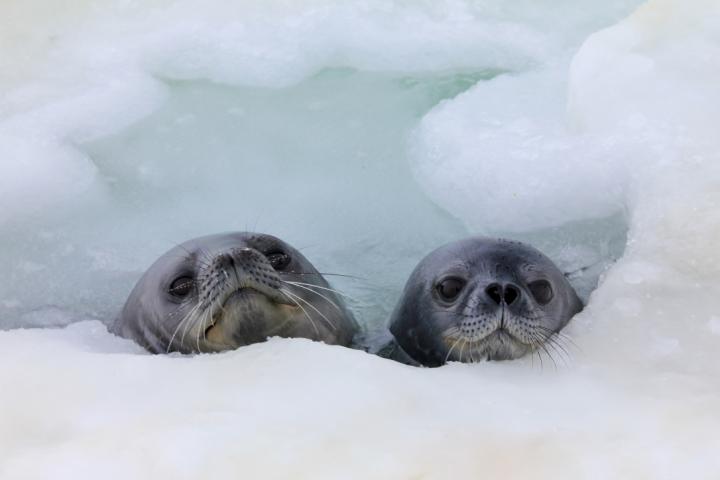Young Antarctic Weddell seals, unlike most other seals, swim with their mother, and they prioritize learning to swim and navigate over learning to forage while they are still dependent
They’re cute, they’re furry, and they start diving into frigid Antarctic waters at 2 weeks old. According to a new study from California Polytechnic State University, Weddell seal pups may be one of the only types of seals to learn to swim from their mothers.
Weddell seals are the southernmost born mammal and come into the world in the coldest environment of any mammal. These extreme conditions may explain the unusually long time they spend with their mothers.
The study, “Early Diving Behavior in Weddell Seal (Leptonychotes Weddellii) Pups,” was published earlier this month in the Journal of Mammalogy.
According to the Seal Conservation Society, adult Weddell seal females are slightly longer than males and grow to nearly 11 feet long and weigh from 800 to 1,300 pounds. Pups are born about 4-5 feet in length and weigh 50-65 pounds.
In most seal species, pups nurse on land for up to four weeks and don’t go in the water until after they’re weaned. They must then learn to swim and forage by themselves. Weddell seal pups, on the other hand, stay with mom for six to seven weeks.
“Most seals don’t get to learn anything from mom, so we wanted to know what are the important lessons that they need in this extremely cold environment,” said Heather Liwanag, a Cal Poly biology professor and lead researcher. “We were also interested in understanding how adults become such incredible divers. Where do they start?”
Adult Weddell seals are one of the champion divers of the pinniped world, able to hold their breath for up to 90 minutes. In comparison, a harbor seal can hold its breath for about half an hour.
Using tracking instruments, the research team measured how deep the pups dove and what time of day they were in the water. They compared this to what was known about when and how deep the mothers dive during this time.
The data showed that pups were in the water at the same time as mothers and so the moms were likely teaching the pups how to survive. But what, exactly, were they teaching? One possible lesson is foraging for food, but the pups weren’t diving to the depths needed to find prey.
The more likely explanation is that mom is teaching her pup how to swim and navigate in the 28-degree Fahrenheit water. Because much of the swimming in Antarctica happens beneath a sheet of ice, one of the most important lessons may be how to find a breathing hole. The pups need to breathe every six minutes and on average held their breath for less than three minutes.
“One of the common causes of death in young Weddell seals is drowning,” Liwanag said. “It’s important that they learn how to find breathing holes in the ice that allow them to take frequent breaths, until they develop the ability to hold their breath for longer durations like the adults.”
Future research will focus on whether this teaching behavior explains variation in pups’ development.
Scientists think Weddell seal behavior might also help them understand how climate change will affect ice-dependent seals at both poles.
###
For more on the study, read the abstract at https:/
Media Contact
Heather Liwanag
[email protected]
Related Journal Article
http://dx.





